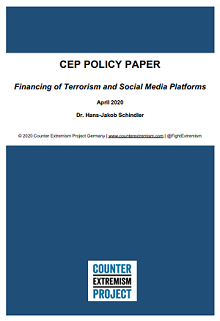
The misuse of social media and other Internet services by terrorist organizations, including for financing activities, has been regularly discussed in the media and among experts. In January and March 2020, the Counter Extremism Project (CEP) conducted a study to evaluate the current defense mechanisms of large social media platforms against the misuse of their services by financiers of international terrorism or for the financing of terrorism.
This analysis involved two steps. First, CEP tested whether major financiers of al-Qaida and the Islamic State in Iraq and the Levant (ISIL), as identified by the United Nations Security Council, are able to maintain profiles on large platforms where they could possibly continue their activities via social media. In January 2020, CEP found that around a dozen of the most notorious financiers apparently continued to maintain social media profiles.
Secondly, CEP examined the community standards of global social media platforms. In March 2020, CEP found that the community standards of major global platforms, including crowdfunding platforms, did not explicitly exclude terrorist financing. As the respective community standards reflect the content moderation priorities of each platform, the lack of improvement indicates that social media platforms potentially do not prioritize defending against terrorist financing.
This indicates that there is still room for improvement in social media platforms’ defense mechanisms against the misuse of their sites by terrorist financiers and against the misuse of their services to finance terrorism.
CEP has two fundamental recommendations to improve the defense mechanisms of platforms:
- Since terrorist financing is the basis of any terrorist operation, the tech industry should counter the risk that their services are misused for this purpose and proactively search for profiles of financiers of terrorism on their systems.
- Social media platforms should revise their community standards and subsequently increase awareness of terrorism financing risks among their internal content monitoring and moderation teams. This is particularly important also for crowdfunding platforms.